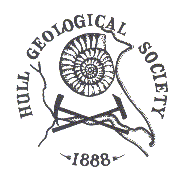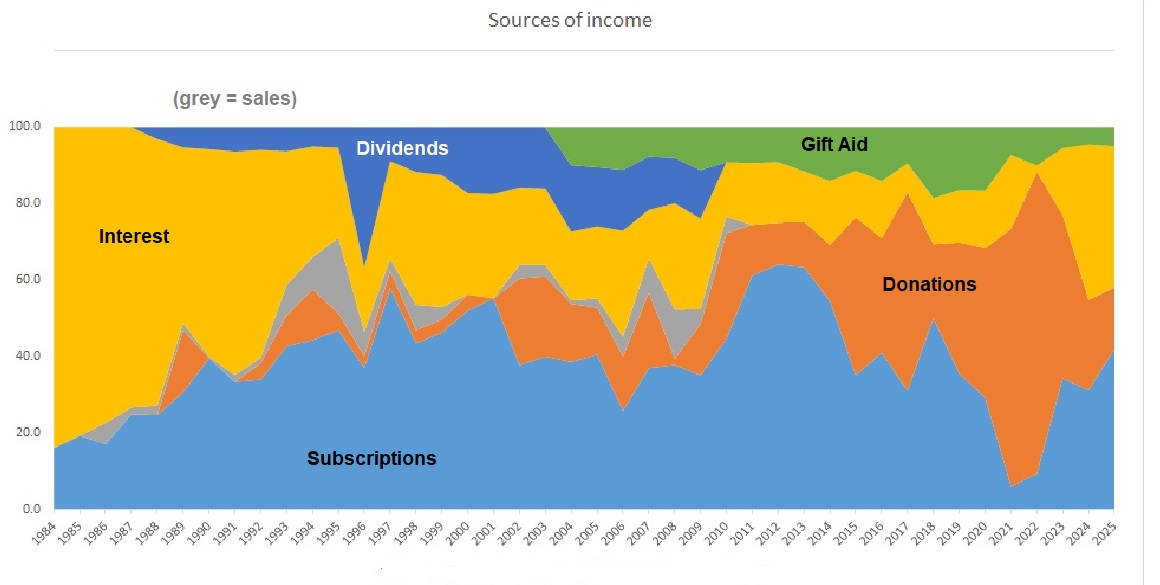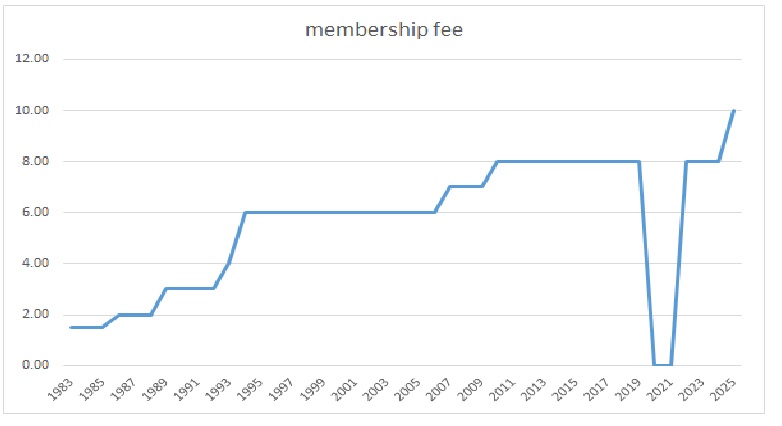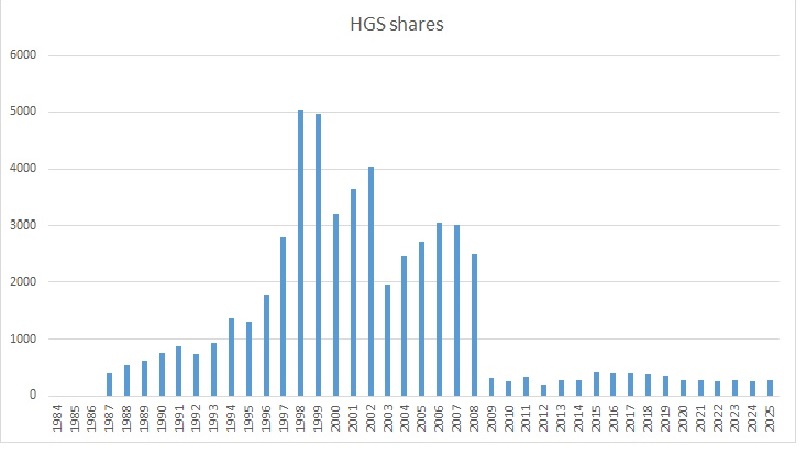

Humberside Geologist no 18
A history of the Hull Geological Society from 1984 to 2025
by Mike Horne FGS
Chapter 3.
HGS funding from 1984-2025
There have been five main sources of funds for the Hull
Geological Society over the years. These are membership subscriptions, interest
on savings and dividends, sales, donations and reclaiming gift aid.

Figure
1 - Sources of funding for the Hull Geological Society by percentage
(Key –
green is Gift Aid, dark blue is Share Dividends, yellow is Interest on Savings,
grey is Sales, orange is Donations and pale blue is Membership Subscriptions.
The source is the HGS Treasurer’s Annual Reports.)
The Society’s financial year ends on the last day of February.
The Treasurer presents a financial report to the Annual General Meeting in March
and submits the relevant parts to the Charity Commission. Annual subscriptions
were due on 30th September and that roughly coincided with the start
of the Winter Programme of lectures which was posted to members by the
Secretary. This was changed in 2017 to a calendar year to fall in line with
other similar clubs and existing members were given three months’ free
membership, though the request for the subs continued to be sent in October by
post. More recently communication with members has become more flexible, as
increasing numbers opted to receive correspondence by e-mail, thus reducing the
need to print and post our formal programmes. From 2021 the Treasurer has
encouraged members to pay by bank transfer rather than with a cheque or cash.

Figure
2 - Hull Geological Society annual subscription rates for ordinary members in
Pounds Sterling.
The annual subscription rates have increased slowly over the
years from £1.50 in 1984 to £10 in 2025. Originally there were different rates
for ordinary (individual) members (£2 in 1986 and £8 in 2024), family members
(£2.50 in 1986 and £10 in 2024), retired members (£1 in 1986 and £6 in 2024) and
students (£1 in 1986 and £3 in 2024). Other rates were introduced as required.
It was agreed that institutional members such as local museums and colleges
should pay the same rate as family membership. A discount was offered to
students paying for two or three years in advance. Subscriptions were waived for
existing members during the Covid pandemic lockdowns of 2020 and 2021. In 2025
all the different rates were rationalised to £10, though if this causes
financial hardship to any keen members the fee is negotiable.
The Society is very fortunate to have been left a legacy by C F B Shillito in 1951. In fact it was a demand for the income tax on the interest on this fund that led to the dormant Society reforming in 1961 and requesting charitable status. These funds have continued to grow because there has always been a surplus of income over expenditure for the last 40 years. The interest on the savings has meant that the Society has been able to keep the subscription rates relatively low.

Figure 3 - The value
of the HGS holding of TSB (later Lloyds) shares in Pounds Sterling.
On the advice of the Treasurer in 1987 the Society bought some
shares in the Trustee Savings Bank when it demutualised. These shares cost £500
and were paid for in two instalments. They provided the Society with dividends
for a number of years though the share value fluctuated. The TSB merged with
Lloyds Bank and the shares became Lloyds Bank shares. Their value dropped
substantially in 2008 with the global banking crash and dividends ceased. In
2024 following the death of the Treasurer Rod Towse it was agreed that the
shares be sold, as they were in the name of a previous Treasurer. They were
eventually sold for £269 after the deduction of fees. Over the 26 years the
Society held the shares they lost £241 in value but we did receive £2505 in
total dividends for the first 19 years [source – HGS Treasurer’s Annual
Reports].
Sales have not been a major source of income for the Society
as we only have our publication Humberside
Geologist to sell and since the Society decided to make a digital version
freely available on the World Wide Web these sales have dropped off. In recent
times many members don’t even collect their free printed copy of the journal.
There are also resales of items that are included under this heading which are
not really a source of profit: on occasions the Society has made a bulk purchase
of books and geological equipment to resell to members at cost price.
Occasionally the Society has sold books and specimens donated by members, though
in some years the funds raised may have been classed as donations in the
accounts.
Over the years the Society has received a few sizeable
donations from members notably Patrick Boylan, Jack Doyle and Anna Kirk-Smith.
Some members have sponsored events: Paul Richards paid the mini-bus hire fee for
a long distance field meeting in 2000 and Mike Horne paid the speaker’s fee for
a public lecture in 2016 to celebrate his birthday. The Society also received
sponsorship from Singleton Birch Lime Products towards the cost of printing
Humberside Geologist numbers 13 and
14.
At some public events such as Roadshows the Society has asked
for donations from those attending – in particular at the “Finds Desk”. Also
included as donations are the proceeds of the sale of second hand books that
have been donated to the Society and the “lucky dip” specimens donated by
members. Members were encouraged to
make a donation towards the postage costs of printed copies of
Down to Earth (the magazine edited and published by Chris Darmon of
Geosupplies in Sheffield) when they collected them at meetings. The Society
started to ask members if they wish to make a donation in addition to their
annual subscription from 2002. In the pandemic years of 2021 and 2022 several
members made donations to the Society when the annual subscriptions had been
suspended.
In 2004 the Society entered an ink cartridge recycling scheme
to raise funds and encouraged members to participate. This was not so successful
because the cheque from the company to the HGS bounced because the recycling
company had declared themselves bankrupt!
In 2001 the Society started to reclaim the income tax on some
members’ subscriptions and donations to the Society if they have made a Gift Aid
declaration. This has not been
claimed from HMRC every year, but it can be done retrospectively.
In 1992 the Society received a grant from the Curry Fund of
the Geologists’ Association to pay half of the construction costs of a shelter
to protect the exposure at Rifle Butts SSSI from weathering. This money was kept
separate from the Society’s general funds and Donald Beveridge invested it in a
building society until it was needed. Interest rates at that time were quite
high and the account accrued some interest, which remained after the shelter had
been constructed and paid for. This became the HGS Conservation Fund. In 1996
the Building Society informed the HGS that the account had to be held by an
individual so it was transferred to the Secretary. In 1997 the HGS received some
shares when the building society demutualised and these were held personally by
the Treasurer. The shares were offered to the Curry Fund of the Geologists’
Association but they said the HGS could keep them. In 1998 it was agreed that
the shares should be sold and a new Conservation Fund should be created with
three Committee members of the Society as the Trustees. The Charity Commission
told the Society that the Conservation Fund, although it was consistent with the
aims of the HGS, should not have different Trustees so this was changed in 1999.
We were made aware that as a charity the Society should not have a separate fund
which appeared to have different aims, so the Conservation Fund was incorporated
into the general funds in 2005, but ‘ring fenced’ for geoconservation at Rifle
Butts and in the East Riding. In 2017 the funds of the East Yorkshire RIGS Group
were added to the Conservation Fund when it merged with the Hull Geological
Society. Any costs incurred for geoconservation in the area are taken from this
virtual fund (including minor maintenance at Rifle Butts) and its value is
increased annually in proportion to the interest received on our total
investments.
[I thank HGS Treasurer Graham Evans for helping with this
chapter.]
copyright Hull Geological Society 2025